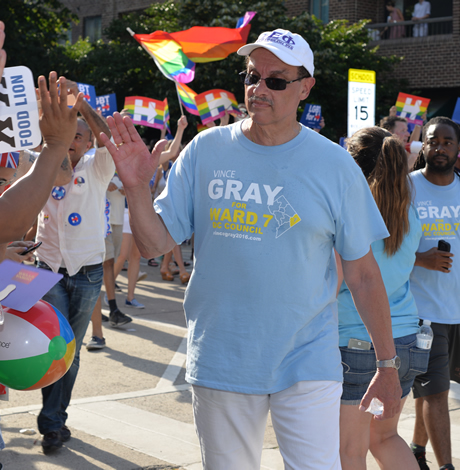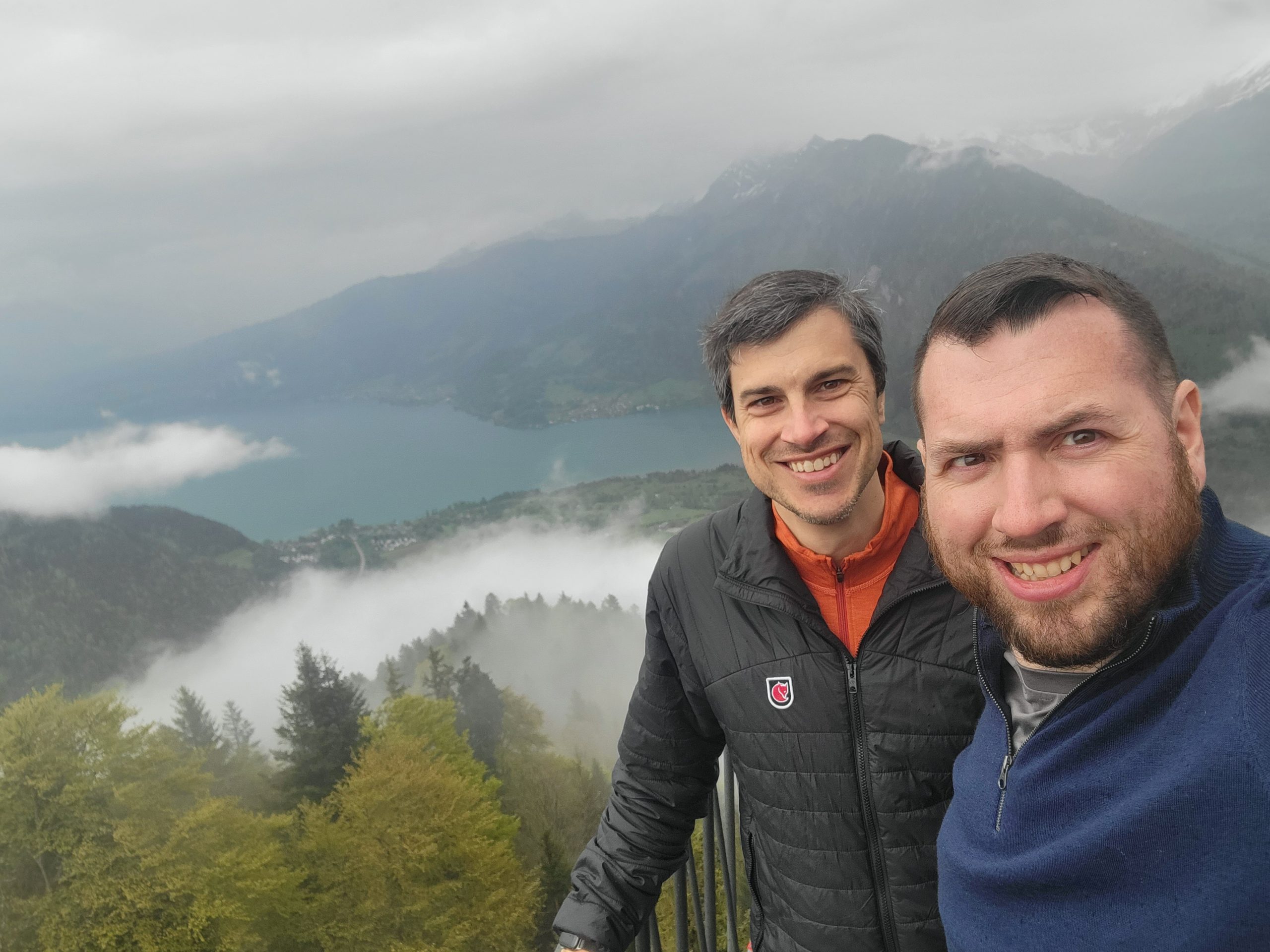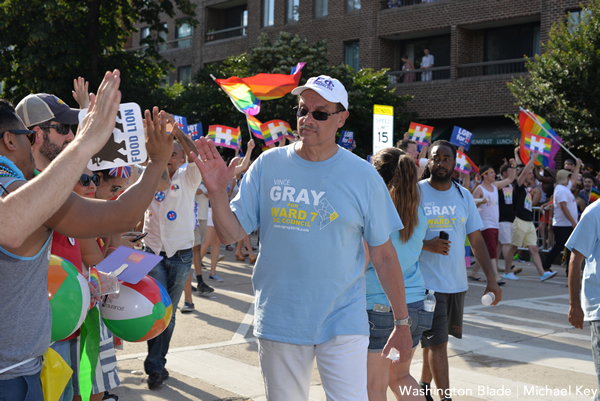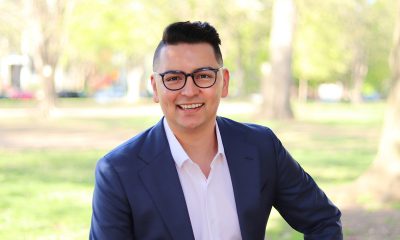Opinions
D.C. needs Council member, not mayor, Vince Gray
Mayor Bowser likely to have easy path to winning second term

Labor Day weekend is traditionally the launch of the next political campaign season, with politicians typically announcing next-aspiration intentions following the holiday.
In D.C., the guessing game regarding candidate composition for the 2018 mayoral race has been the subject of increasing media conjecture in recent weeks. By most accounts, it may be one of the most predictable in the city’s electoral history.
Incumbent Mayor Muriel Bowser appears likely to have an easy path seeking re-election to a second term. She is expected to have little, if any, significant opposition – or, put another way – won’t encounter a successful challenger.
While Bowser’s support is broader than deep, envious approval numbers for a mayor provoking less passion than performance appreciation are at nearly 70 percent.
Bowser has neutralized skeptics who, based on her rather lackluster tenure as a D.C. Council member, had ample reason to wonder if she was well suited for the task of the District’s top hometown spot. While she may not have won the wholehearted support of those doubters, she has successfully navigated her role in a city that plays politics as bloodletting sport.
Beating expectations and being perceived as over-performing are a politician’s best survival situation. Bowser benefits from being mayor during continued population growth filling the city’s tax coffers combined with strong private sector development generating growing civic pride, along with satisfaction regarding public safety statistics. Simply not interrupting those trajectories, while balancing such stewardship with signature efforts to facilitate affordable housing while sheltering the homeless, has proven a winning formula.
Speculation regarding challenges by former mayor and now D.C. Council member Vincent Gray or first-elected first-term D.C. Attorney General Karl Racine continue to dissipate. Neither seems disposed to enter the race – both likely recognizing their chances of besting Bowser are unfavorable.
Racine suffers low name recognition despite citywide election and evokes even less enthusiasm. He also lacks possession of a politician’s personality, in addition to appearing to genuinely relish his current role.
Former Mayor Gray, defeated for re-election in the previous Democratic mayoral primary by Bowser and subsequently elected to the Ward 7 Council seat, may desire to avenge that loss and diminish the legacy of an alleged campaign financing scandal never prosecuted but that derailed his winning a second term. Gray, however, seems smartly moving away from seeking to settle that score. He is undoubtedly looking at polling numbers indicating he would not prevail.
Others who may covet becoming mayor some day know that, in the one-party town that is Democratic D.C., “waiting your turn” is a basic tenet of advancement.
Gray’s Ward 7 constituents – and the city as a whole – greatly gain from his return to serving on the Council. The former mayor has been a strenuous and effective advocate for the often-neglected east end of the District.
More important is that Gray joins a small but critical cadre of leaders on the 13-member D.C. Council appropriately measuring matters so as to balance the competing interests of all the city’s components. Like Bowser, he learned the importance of circumspection on issues and comprehending legislative and regulatory implications, especially when affecting the business community.
Gray, also a former Council chair, serves as a vital component of a valuable “brain trust” of experienced civic leadership alongside colleagues Jack Evans of Ward 2, Mary Cheh of Ward 3, and Council Chair Phil Mendelson.
An example of this collective contribution is that all four seasoned Council members have proposed variable remedies to revise gargantuan funding and administrative requirements for planned implementation in 2020 of a massive paid leave mandate. Deliberations on what is now widely expected to produce a legislative repair also urged by Bowser that will reduce the financial burden on local businesses while not substantively affecting benefits begin in mid-October.
It may be tough for a former mayor to find complete fulfillment as a Council member, but D.C. distinctly benefits from having Gray sitting in that seat.
Mark Lee is a long-time entrepreneur and community business advocate. Follow on Twitter: @MarkLeeDC. Reach him at [email protected].
Commentary
A conversation about queers and class
As a barback, I see our community’s elitism up close

In the bar, on the way to its now-Instafamous bathrooms, there’s a sign that reads, “queer & trans liberation means economic justice for all.”
I remember seeing that sign the first week the bar opened, and ever since I often find myself reflecting on that message. I stand fully in agreement. That’s why laws protecting queers in the workplace are essential, for far too often we are targeted otherwise. It’s also why I love working at the bar, since it provides opportunities for queers from all over the spectrum to earn a living. At a time when I gave myself space to pursue art, it was the bar that enabled me to do so.
It’s one thing to support the LGBTQ community in spirit, but that spirit means jack in a capitalist society if viable economic opportunities don’t exist. Speaking of jack, there’s a fellow barback named Jack who I fangirl over often. Jack is a decade younger than me, but damn I wish I had his sex appeal at his age (or any age, for that matter). He also has a mustache that easily puts mine to shame.
Jack not only agrees but took things one step further. “Economic inequality IS a queer issue,” he told me, “especially as we move into the most uncertain period of American politics I have ever lived through, it is apparent our identity is now a fireable offense.”
Uncertain is right. We’re fresh off the heels of a trade bonanza, one caused for literally no reason by our current commander in chief. Yet there emerged a strange division when discussing the trade war’s “unintended” consequences. For working class comrades like Jack and myself, we’re stressed about increasing prices in an already tough economy. But the wealthier echelons of our country had something else on their mind: the spiraling stock market. This alone highlights the story of our economic divide, where the same event produces two separate concerns for two distinct classes.
This is not to say the stock market is not important, but sometimes the media forget many Americans don’t own stock at all, including a vast majority of people between 18 and 29. In fact, according to Axios, the wealthiest 10 percent of Americans own 93 percent of the entire stock market, with the richest 1 percent holding $25 trillion — that’s right, trillion with a “t” — in market value. So, when the president reversed course on trade, it was less about high prices hurting everyday Americans and more about the dent created in the wealth of the wealthiest. And I’ll admit: that bothers me a lot.
If there is any takeaway from Trump’s trade war, it should be this: Economic inequality is the highest it has been in decades and, if left unchecked, will destroy the fabric of our country. We are steadily moving toward oligarchy status—if we’re not there already, that is—and it seems to grow worse with each passing year and administration. But in a city of D.C. gays who often skew corporate, I wonder: Are we all on the same page here?
After becoming a barback, I have my doubts. From questions about what else I do, to comments encouraging me to work hard so that I can be a bartender one day, I quickly learned the gay world is not too fond of barbacking. Barebacking, sure, but not barbacking. And hey, I get it—we’re not the alcohol hookup at the bar. Still, we are part of the service industry, and while some people are incredibly kind, you’d be surprised at how many turn up their noses at us, too.
Recently, I’ve come to realize my class defines me as much as my orientation does, if not more. Naturally, when you come from a rough neck of the woods like I do, it’s easy to feel out of place in a flashy city like D.C., which Jack noticed, too. “Anyone from a working class background could testify to that,” he said. “I don’t really know anyone from true upper class backgrounds, but I’d imagine their experience is one that leans into assimilation.”
Assimilation is a key word here, for admittedly gays love to play with the elite. Often, we don’t have children, meaning more money for the finer things in life, but that also means we may not think about future generations much, either. I’ve written before that our insecurity growing up has us ready to show the world just how powerful gays can be—power that comes in trips to Coachella and Puerto Vallarta, or basking in the lavish houses and toys we own. There’s already a joke that gays run the government, and corporate gays kick ass at their jobs as well. So, given the choice between fighting inequality and keeping a high-paying job, I must admit I have a hard time seeing where D.C. gays stand.
Admittedly, it worked out in our favor before, given that many corporations catered to our economic prowess over the years. But look at what’s happening now: Many corporations have kicked us to the curb. Protections are being stripped from queers, particularly for our trans brothers and sisters. Law firms are bowing down to Trump, offering hundreds of millions in legal fees just for their bottom line. All of this will hurt both queers and the working class in the long run, so again I ask: Corporate gays, where do you stand? Because if you remain complicit, that’s bad news for us all.
I don’t want to sound accusatory, and I hate being a doomsday type, so allow me to end this on a better note. Strength is not about celebrating when times are good. Arguably, true strength emerges when times get tough. These are tough times, my friends, but that also makes now the perfect opportunity to show the world just how strong we are.
At a time when the world is pressuring us to turn our backs on each other, we must defy them to show up when it counts. Corporate gays—now more than ever, at a time when the economy is turning its back on queers, we need you. We need you to stand up for the queer community. We need you to make sure no one gets left behind. We need you to show up for us, so that we can show up for you, too.
Ten years ago, the economy didn’t turn queer out of nowhere. The economy turned queer because we made it turn queer.
And if we did it once, surely we can do it again.
Jake Stewart is a D.C.-based writer and barback.
Opinions
On Pope Francis, Opus Dei and ongoing religious intolerance
Argentine-born pontiff died on Monday

“Good Friday” set the stage for Saturday’s anti-Trump/MAGA “Hands Off” protests serving as a timely lead-in to binge-watching Alex Gibney’s two-part HBO political documentary, “The Dark Money Game” on Easter Sunday. In “Wealth of the Wicked,” nefarious Opus Dei —Svengali Leonard Leo strategically seduces politically disappointed Catholic Federalist Society billionaires into subsidizing a scheme to ‘pipeline’ malleable conservative judges to take over the Supreme Court and overturn reproductive rights.
A key victory for “Operation Higher Court” came in 2010 when SCOTUS ruled 5-4 in Citizens United v Federal Election Commission, that corporations and unions have the same First Amendment free political speech rights as individuals — as long as their unlimited cash donations go to 501 c(4)’s or Super PAC slush funds and not directly to candidates. Twelve years later, in 2022, they got their payoff with the overturning of Roe v Wade by Leo-promoted Catholic justices.
But Leo’s political conniving is not the only exploitation of moral corruption. The documentary exposes conservative Christians too.
Gibney’s anti-hero is a former rabid anti-abortion lobbyist named Rev. Robert Schenck. He tells of turning to a fellow conservative in Cleveland, Ohio after Trump won the Republican presidential nomination in 2016 and asking: “Are we really going to do this? We’re going to choose this man who’s inimical to everything we believe?” The other evangelical replied: “I don’t care how bad he is. He’s going to get us the court we need.’”
Schenck explains the unholy alliance between Christian conservatives and Big Business. “Whenever you talked about government regulation, the argument was eventually — ‘these same characters who control my business are going to start trying to control your church. So, it’s in your best interests that we defang this monster’ — and that brought a lot of religious conservatives over.”
And there’s this: “We have a little aphorism built on a Bible verse: ‘The wealth of the wicked is laid up for the righteous.’ So, yeah, let’s baptize the billionaires’ money. We can do that — and it eventually brought together this alliance.”
Schenck later reveals an intense epiphany that resulted in regret for how much harm he caused. Not so for Leo.
This is an excerpt from Gareth Gore’s comprehensive book Opus, for Rolling Stone Magazine:
“DURING THE DONALD TRUMP YEARS, conservatives — led by Leonard Leo — took control of the Supreme Court … At one Federalist Society event, his good friend Supreme Court Justice Clarence Thomas jokingly referred to Leo as the third most powerful man in the world, presumably behind the pope and the president of the United States.”
On Monday morning, Pope Francis died. I liked this pope, compared to the others. I covered Creating Change during the AIDS crisis when author Paul Monette delivered his brilliant, scathing denouncement of the Catholic Church, then unexpectedly ripped up a portrait of Pope John Paul II. Pope Benedict XVI was just crotchety cruel. But Pope Francis — named for St. Francis of Assisi — had that big smile and genuinely seemed to care about migrants, the vulnerable and the marginalized — like us. He even used the word ‘gay’ instead of ‘homosexual.’
Pope Francis’s reply to a question about a Vatican “gay lobby” on a flight from Rio de Janeiro to Rome made global news. “If a person is gay and seeks God and has good will,” he said in 2013. “Who am I to judge? We shouldn’t marginalize people for this. They must be integrated into society.”
What did this mean? Welcoming inclusion into a family that officially considers us ‘intrinsically disordered?’
And then there was Pope Francis’s interaction with Juan Carlos Cruz — a whistleblower in Chile’s clerical sex abuse scandal.
“He said, ‘Look Juan Carlos, the pope loves you this way. God made you like this and he loves you,'” Cruz told The Associated Press.
Meanwhile the Catholic Church Catechism affirmed, “this inclination, which is objectively disordered, constitutes for most of them a trial.”
Ergo, a behavioral choice.
Therein lies the problem.
LGBTQ people are seen largely as individuals with sinful same sex sexual ‘inclinations.’ So when the pontiff touted ‘the equal dignity of every human being,’ and rebuked Vice President JD Vance with the ‘Good Samaritan’ parable, whereby love “builds a fraternity open to all, without exception” — we are still the exception.
Francis was all also human — having to apologize at one point for using a gay slur. But what of the bigger things like, did he know about the Opus Dei takeover of the U.S. Supreme Court when he chastised Vance about deporting migrants? Did he know that the Archdiocese of Los Angeles agreed to pay $880 million to 1,353 people last October, who allege they were victims of clergy sexual abuse? With a previous payment of $740 million, the total settlement payout will be more than $1.5 billion dollars. Is Leo chipping in to replenish that?
And it’s not over. Earlier this month, Downey Catholic priest Jaime Arriaga, 41, was charged with several counts of child sexual abuse which allegedly happened when he was serving as a transitional deacon at the Our Lady of Perpetual Help Church.
Longtime U.K LGBTQ+ activist Peter Tatchell — who’s campaigned against Catholic homophobia for 58 years — says Pope Francis’ legacy is complicated.
“I extend my condolences to Catholics worldwide on the passing of Pope Francis. While we often disagreed on issues of LGBTQ rights, I acknowledge his more compassionate tone towards sexual minorities. His recent moves to allow blessings for same-sex couples, albeit with limitations, signaled a small but significant shift in Church doctrine,” Tatchell said in a statement.
“However, for millions of LGBT+ people globally, the Catholic Church remains a force for discrimination and suffering. Under his leadership, the Vatican continued to oppose same-sex marriage and trans rights. Catholic bishops lobbied against the decriminalization of homosexuality in many parts of the world. The Vatican still upholds the homophobic edicts of the Catechism, which denounces the sexual expression of same-sex love as a ‘grave depravity’ and ‘intrinsically disordered.’ Francis’s legacy is, therefore, a mixed one — offering some progress, but leaving deep-rooted inequalities largely intact.
“The struggle for LGBT+ equality against a homophobic church must continue. We urge the next Pope to go further — to end the church’s support for discrimination, both within the faith and in the wider society.”

Brad Tennis loves running. For years, the meditative rhythm of his feet on pavement brought him peace like nothing else could. And it turns out, he was quite good at running as he even qualified for the Boston Marathon. But while Brad was chasing his goals, unbeknownst to him, his heart was slowly deteriorating.
In November 2018, out of the blue, Brad was diagnosed with arrhythmogenic right ventricular cardiomyopathy or ARVC, a rare heart condition that causes the heart muscle to break down over time. ARVC increases the risk of abnormal heartbeats and chance of sudden cardiac death. Brad was fitted with an internal defibrillator and told he could no longer run. Doctors warned him that endurance exercise would only accelerate the disease.
After processing the news of this condition, Brad felt like himself for a while. But in 2020, he started experiencing Implantable Cardioverter-Defibrillator (ICD) shocks to halt life threatening arrhythmias. Despite numerous surgical and medical interventions, the shocks began to get more frequent. By 2023, the toll of the disease, the ICD shocks and the treatments led to progressing heart failure. By the end of 2023, he was feeling breathless on stairs, having trouble playing physically with his children and finding it difficult to keep up at work. His world was shrinking.
In February 2024, Brad started the process with Johns Hopkins Hospital to be listed for a heart transplant. A couple of weeks later, he had another shock, more testing and then a doctor put him on ECMO (extracorporeal membrane oxygenation), a life support machine that is used when a person’s heart is failing. Soon after, he got the news of a lifetime: “There’s a heart available and today is the day!”
The organ transplant marked the beginning of a new journey. Brad focused on recovery — building up his strength, learning his new body and adjusting to life with a new heart. Last summer, he was cleared to exercise again and is enjoying playing with his kids — something he deeply missed.

“I would never say I’m back to feeling normal. I’m always going to have to carefully manage my stress and my activities to protect my health and my new heart,” said Brad. “But the transplant was lifesaving and means that I will be there to build a life with my husband and my kids.”
Brad is still moving forward. He and his family are enjoying life again — and he’s even bought a new pair of sneakers with the hope that he’ll be able to return to running regularly.
“Organ donation and transplant have reopened doors that I had thought were closed forever,” Brad shares. “It’s given me the chance to be present and have a full, happy life with my husband, son and daughter.”
His husband, Drew, adds, “Every day, I’m reminded of Brad’s strength, resilience and bravery.”
Brad doesn’t take this lifesaving gift for granted and is grateful to his organ donor hero. “I think it’s an amazing thing — to give life and give hope. Even in tragedy, someone gave me a gift… a second chance. Everyone can register to be a donor and save lives like Brad’s at infinitelegacy.org.
-

 Federal Government1 day ago
Federal Government1 day agoHHS to retire 988 crisis lifeline for LGBTQ youth
-

 Opinions1 day ago
Opinions1 day agoDavid Hogg’s arrogant, self-indulgent stunt
-

 District of Columbia21 hours ago
District of Columbia21 hours agoD.C. police seek help in identifying suspect in anti-gay threats case
-

 Theater4 days ago
Theater4 days ago‘Bad Books’ a timely look at censorship in local library










